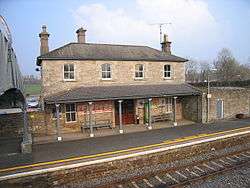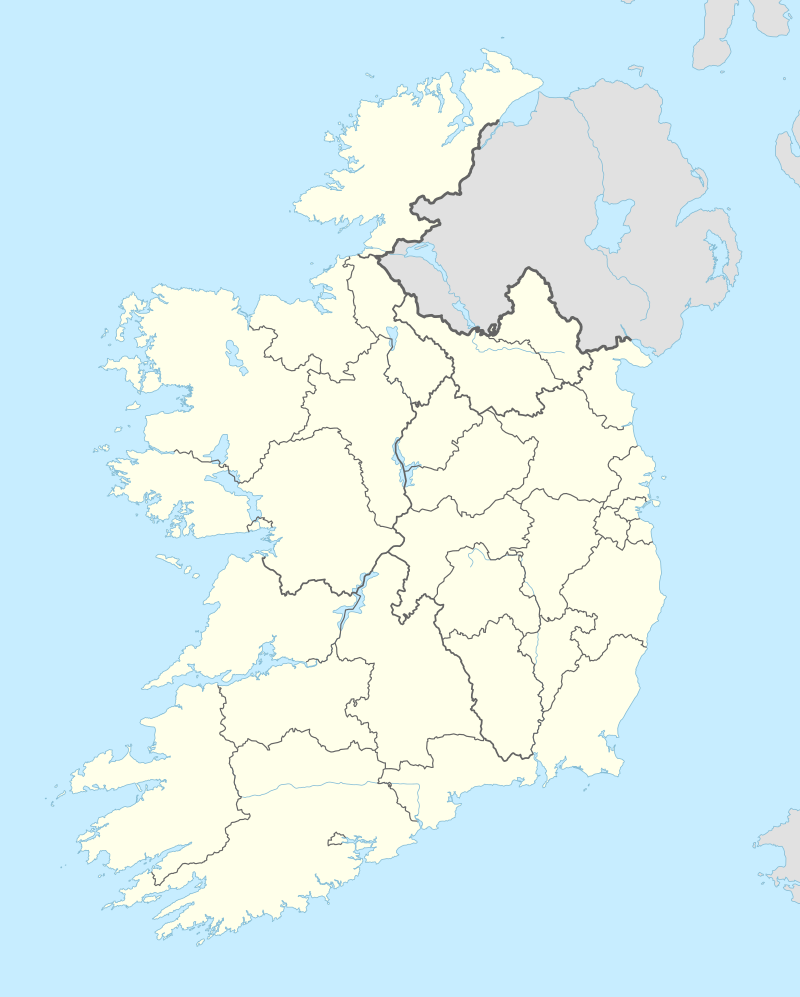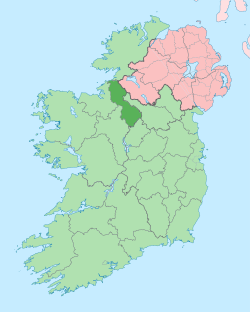Dromod
Dromod (Irish: Dromad, meaning "long ridge, or back of the wood")[2] is a village in County Leitrim, Ireland. Dromod is a noted fishing village beside Bofin and Boderg, which are threaded by the River Shannon. Built along the River Shannon, this is a Tidy Towns winner with a modern harbour frequented by cruiser traffic. The Bog Oak water feature in the centre of the village, entitled 'The Weeping Tree', and was made by a local craftsman from a piece of bog oak which was found nearby.
Dromod Dromad | |
|---|---|
Village | |
 Railway station | |
 Dromod Location in Ireland | |
| Coordinates: 53°52′00″N 7°55′00″W | |
| Country | Ireland |
| Province | Connacht |
| County | County Leitrim |
| Elevation | 282 m (925 ft) |
| Population (2016)[1] | |
| • Total | 555 |
| Time zone | UTC+0 (WET) |
| • Summer (DST) | UTC-1 (IST (WEST)) |
| Irish Grid Reference | N055907 |
Demographics
Between 2006 and 2011, the population of Dromod increased from 210 to 356, an increase of 69.5%.
Dromod railway station
The village has a station on the Dublin-Sligo railway line connecting Sligo and Dublin Connolly long the mainline. Dromod railway station opened on 3 December 1862 and remains in operation, despite closing for goods services on 3 November 1975.[3] Dromod also had a railway station on the narrow gauge Cavan and Leitrim Railway. It opened on 24 October 1887 and finally closed on 1 April 1959.[3] A short section of narrow gauge line has been reopened at the station as part of preservation efforts.[4]
History
In Gaelic Ireland the place was called "Dromode mac Shanley" in recognition of the dominant Mac Shanly sept of Muintir Eolais.[5] The town is mentioned once in the Irish Annals- "1473: A great war broke out in Muintir-Eolais; and much was destroyed between them, both by burning and slaying. An attack was made by Mac Rannall on the town of Mac Shanly, and the town was burned, and Donough, the son of Donough Mac Shanly, and many others, were slain by him".[6]
An Iron works was established at Dromod c. 1693 – c. 95.[lower-alpha 1] Pig iron brought to Dromod Finery forge was used to produce an malleable iron product, for transportation to Dublin and Limerick.[8][9][10] The operation was closed down in the 1790s, due to an exhaustion of forests locally.[7]
Through at least the 19th and 20th century, an impressive seven annual fairs were held at Dromod- 1 January, 28 March (or 29th), 15 May, 26 June (or 29th), 14 August, 10 October (or 11th), and 11 December.[11][12]
People
- The 19th century poet John McDonald lived near Dromod in county Leitrim.
Notes and references
Notes
- Iron works at Dromod and Ballinamore, on land confiscated from the Irish during the plantations of Ireland, had been established around 1695, by english adventurers named Capt. William Slacke, John Skerret, and Joseph Hall.[7]
Primary sources
- "Census 2016 Sapmap Area: Settlements Drumod". Central Statistics Office (Ireland). Retrieved 9 July 2018.
- Joyce 1913, pp. 331,336.
- "Dromod station" (PDF). Railscot - Irish Railways. Retrieved 5 September 2007.
- Oram, Hugh (21 July 2016). "All aboard – An Irishman's Diary about the Cavan & Leitrim Railway". The Irish Times. Retrieved 24 May 2020.
- Downs Survey 1641.
- AFM, pp. M1473.19.
- Kelly 1995, pp. 1-12.
- Meehan 1926, pp. 413.
- Buchan 1860, pp. 12.
- Murray 1866, pp. 155.
- Longman 2011, pp. 405.
- Watsons 1830.
Secondary sources
- Annals of the Four Masters, ed. & tr. John O'Donovan (1856). Annála Rioghachta Éireann. Annals of the Kingdom of Ireland by the Four Masters... with a Translation and Copious Notes. 7 vols (2nd ed.). Dublin: Royal Irish Academy. CELT editions. Full scans at Internet Archive: Vol. 1; Vol. 2; Vol. 3; Vol. 4; Vol. 5; Vol. 6; Indices.
- Downs Survey (1641). "Town of McShanley".CS1 maint: ref=harv (link)
- Joyce, P. W. (Patrick Weston) (1913). Irish names of places (PDF). v.3. Dublin : Phoenix.CS1 maint: ref=harv (link)
- Longman (2011) [1819]. Traveller's New Guide Through Ireland, Containing a New and Accurate Description of the Roads (digitized from original in Lyon Public Library ed.). Longman.CS1 maint: ref=harv (link)
- Meehan, Joseph B. (1926). "Cavan and Leitrim Items in 18th Century Periodicals. I." (PDF). Breiffne Antiquarian Society. Cite journal requires
|journal=(help)CS1 maint: ref=harv (link) - Buchan, Patrick (1860). "On the Composition of the Iron Ores of the Connaught Coal-field". The Journal of the Royal Dublin Society, Volume 2 (Original from the University of California; Digitized 20 October 2010 ed.): 1–27. Cite journal requires
|journal=(help)CS1 maint: ref=harv (link) - Watsons (1830). The Gentleman's and citizen's almanack ... for the year (PDF). Dublin, Printed for S. Watson [etc.]CS1 maint: ref=harv (link)
- Murray, John (1866). Handbook for travellers in Ireland (2 ed.). John Murrary. p. 155.CS1 maint: ref=harv (link)
- Kelly, Liam (1995). The face of Time. Lilliput Press.CS1 maint: ref=harv (link)
External links
| Wikimedia Commons has media related to Dromod. |
